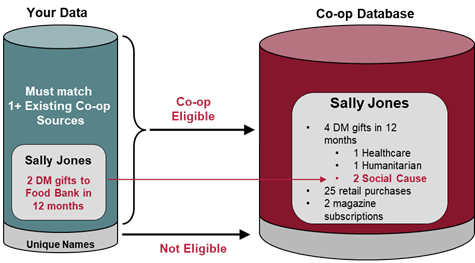Cooperative databases (better known as co-ops) are a valuable tool for acquisition in all fundraising seasons but can be especially useful during a recession. However, in order to participate, nonprofit organizations must share their donor’s transactional data. This continues to be the biggest reason some nonprofits do not participate in co-ops. But don’t stop reading.
We have received a lot of questions from nonprofit organizations about participation in co-ops and how to handle acquisition during this challenging time. We’ve compiled all of those questions and our answers here in a simple FAQ page.
If you have a question and don’t see it listed here, we welcome you to contact us so we can add it to this list.
What is a co-op?
Co-ops are consumer databases built from direct-response transactions, and many organizations contribute to them. Nonprofits can benefit from these databases through the shared insight of collective data.
How do co-ops work?
Thousands of nonprofit, retail and commercial organizations contribute customer and donor transaction data to the co-op. Co-ops match their records with your donors. Individuals matching two or more sources are included in the database while unique individuals are excluded.
On average, 90% of nonprofit donors are not exclusive to their organization. And most donors give to 2+ organizations.
Because of this, most individuals match at least 20 or more data sources, molding an extremely enhanced view of each consumer, including recent purchases, catalog subscriptions and donation history. These are the valuable prospects we are looking for.
Co-ops utilize this wealth of insight to develop donor profiles and custom models that identify new donor prospects across the entire co-op database predicted to have the highest response to your acquisition.
Once these donors are identified, the co-op will provide you a prospect list at almost half the standard list rental price. You only pay for the names rented, and no additional fees or costs are involved for joining the co-op or building models.
Why should my nonprofit participate in a co-op?
Co-ops give you access to highly customized and valuable donors. And, because co-ops don’t charge for participation, they’re more cost-effective than rental lists.
The models also ensure that you’re getting the cream of the crop. Lists are vetted and only made up of the people who have donated in the past, excluding any names you already have in your file.
Will a co-op violate my nonprofit's privacy policy?
This depends on your existing donor privacy policy.
First, the co-op is not considered a list exchange or rental. A significant benefit of the co-op is that names must appear on at least two or more source files in a 24-month period to be included in the database. Your donor transactions contribute additional insight to consumers who already exist in the database. However, your unique donors are never shared with other participants.
Prospect models are applied across the whole co-op database, so no single list is used as a whole. The model does not know from which source the name appeared since a single name appears on multiple sources.
In addition, all donors who have opted out of direct mail contact from your organization will be excluded from the co-op database, thus maintaining all active ‘no mail’ or exclusion flags.
However, as states continue to change requirements around data privacy, you should always evaluate your privacy policy before participating.
It's best to look beyond the minimum of what is legally required and focus more on what consumers/donors have come to expect as best practice. Consumers hold nonprofits to the same—if not higher—standard as commercial entities. Bottom line is that donors want to know what is happening with their data and have an opportunity to opt out.
Los Angeles Mission has an excellent example of a privacy policy on their website here.
Will my donors receive more mail?
Studies show that individual records within the co-op receive less than one additional mailing per year as a result of co-op participation. Many of these individuals are already being mailed through traditional list rental programs. Through stringent modeling the co-op actually becomes more selective than a traditional list rental.
Will other organizations know we participate in the co-op?
No. Co-ops are blind databases, and participating organizations are never disclosed or flagged.
Should my participation strategy change during financial struggles?
What works for acquisition in good economic times will also work in bad.
The important part is to stay the course and push forward with your acquisition efforts. Because cooperative databases are a cost-effective solution, participation is a great option to lean to for acquisition during challenging times. Make sure you are taking full advantage by testing different co-ops and models to find what is most effective for your organization.






Leave a comment: